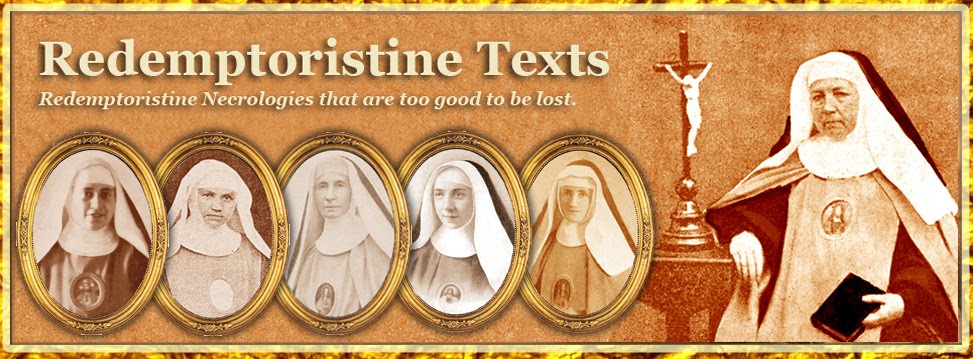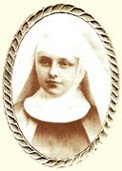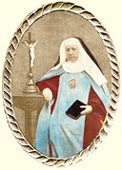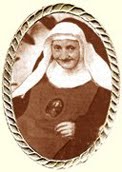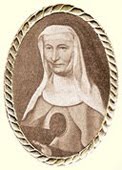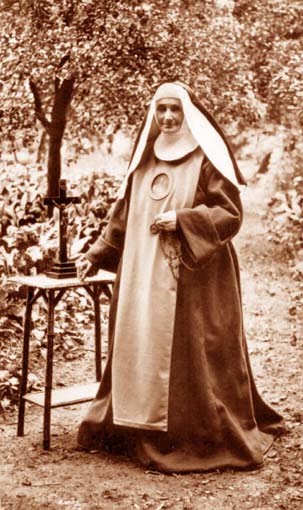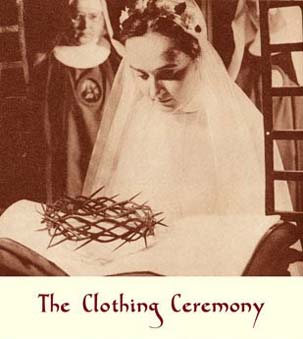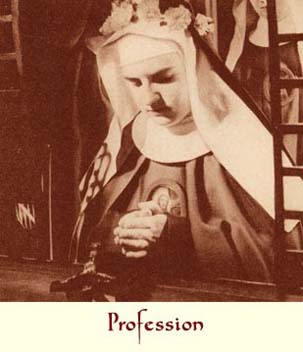Chapter III. Letters by Rev. Father Mauron to Mother Marie-Philomena.
The beautiful pages that we have just read will be happily completed by some extracts from the letters addressed to Mother Marie-Philomena by Rev. Father Mauron, the Rector Major of the Congregation of the Most Holy Redeemer. In them we will see how this good Mother was profoundly esteemed by the holy priest whom we have mentioned.
“Very Reverend Mother,” he wrote to her on 13th January 1863, “I have been touched by the prayers that you never cease to offer for me, and in particular the communion that your community offered me on my feast day. I thank you also, in a special manner, for the beautiful Infant Jesus that you have had the great kindness to send me. It was passed on to me by Mr. de Splentere last Saturday, on the eve of the Finding of Jesus in the Temple. On the day of my feast, I had it with me in recreation. It is useless for me to tell you that everyone admired this beautiful piece of work, both the little Child, so adorable and so gracious, and the cradle so finely worked. To give it honour, the Community spent the recreation chanting some beautiful canticles in its presence. So you can see from this, my Reverend Mother, how much your present gave us pleasure.
“But in return, what can I offer you? – Since the adorable little Child Jesus is so much loved in your community, I would not be able to wish you anything more precious that the full, perfect and constant possession of this divine Saviour. For there is nothing more beautiful on this earth than a religious community in which Jesus Christ lives with His spirit of simplicity, humility and ardent charity, in which you both think, live and breathe only for Jesus Christ; a community in which, finally, Jesus is the centre, the link, the soul and the life! – May the Immaculate Virgin Mary and blessed Father, Saint Alphonsus, whom you love and venerate so much, grant you, in all its fullness, the spirit of Jesus Christ! For as you know, loving Our Lord fully and making Him known to others was the insatiable desire of the heart of Saint Alphonsus, and such must therefore also be the first preoccupation of each one of his children.
“This is why I am happy to know that you never cease to address fervent prayers to Our Lord for the good success of the missions and works of the Congregation. So continue to storm our divine Saviour. Through your prayers you will rejoice the heart of God and the heart of Saint Alphonsus, and you will contribute in an efficacious manner to the salvation of souls.”
On 15th January 1866, the Rev. Father Mauron wrote:
“I have been especially touched by the recommendation made to these two saintly ladies [2] who have gone to receive their reward in heaven, to pray from up there for me and for the whole Congregation. The number of his children in heaven continues to grow, and there also the number of intercessors with Our Lord in favour of the family of Saint Alphonsus. All of this is very consoling, especially since I have received from the mouth of Mons the Bishop of Bruges the confirmation of what I have already learnt from elsewhere, that regular observance and a good spirit continue to flourish in your Monastery.”
Regarding an image of the Ven. Father Hofbauer [3],
Father Mauron adds:
“I have offered up my prayers that one day we will also be able to introduce the cause of some holy Redemptoristine, and the best means of arriving at such a desirable result is for you to become adept in the precious counsels that Saint Alphonsus left us as his testament to the religious of his Congregation of the Most Holy Redeemer. These forty four counsels truly contain all the essence of the religious perfection of a true Redemptoristine, and in practising them faithfully, a daughter of Saint Alphonsus will certainly merit being venerated one day on the altars.”
Another time, he enlivens his zeal: “I am persuaded”, he wrote on 2nd January 1867, “that you should pray as much as possible for the needs of the holy Church and for its venerable chief on earth, Our Holy Father Pius IX. It is a duty for all the children of the holy Church in the sad times that it is passing through, but most especially for all those who, in their religious life, draw must often at the fountain of graces of which it is the repository.”
Rev. Father Mauron recommends to her the same interests the following year, and he brings her up to date with an important matter. “You would perhaps have learnt,” he tells her, “that the Holy See has favourably received our request to see Saint Alphonsus solemnly placed among the number of the Doctors of the Holy Church. The cause has been officially introduced and is progressing favourably. I recommend it to your prayers, as well as that of the beatification of the Ven. Father Clement Hofbauer.”
In this year of 1868, death claimed four victims in the Monastery of Bruges. [4] Father Mauron consoles the good Superior in these touching lines: “During the night of Christmas that you have had the good fortune to spend at the foot of the Manger, I am sure that the divine Child will have happily received all your supplications. You can be even more sure of seeing them heard than you can believe that four of your good companions have had the good fortune of spending this feast in Paradise, and, on this occasion, they will certainly not have forgotten you. Continue, my Reverend Mother, to recommend to Our Lord and to our dear Lady of Perpetual Succour the present and forthcoming needs of the Congregation. Certainly the future is a sombre one, and God alone knows if some of the trials with which Providence has just struck our flourishing houses in Spain is not reserved here for us too.”
On 23rd June 1874, Father Mauron stretched out his hands to Mother Marie-Philomena on behalf of the Redemptoristines of Vibonati, in the Diocese of Policastro (Kingdom of Naples), deprived of their property by the Italian government. Three weeks later he wrote back:
“I have recently received your good letter of 1st July, enclosing two banknotes of 100 francs each, which your charity offers as alms for your poor fellow Sisters of Vibonati, so worthy in every respect of commiseration. I sent this money on to them straight away, and the Superior, Sister Maria Raphael, has just let me know she has received it, never ceasing in her thanksgiving in her own name and in the name of her forty Sisters, for this providential assistance. She begs me to be kind enough to express all their gratitude to you in their name, and to assure you that they will return it to you in fervent prayers for their benefactors.
“I was very happy,” he adds, “to learn that the business of your foundation at Louvain is progressing so favourably and I hope that, there like Bruges, a good spirit will reign, and the spirit of prayer and the interior life that Saint Alphonsus has inculcated so much into his Daughters. I am truly consoled, and Saint Alphonsus in heaven rejoices to see them so numerous in Belgium.”
Mother Marie-Philomena had expressed the desire that the history would be written of the first times of the Institute of the Redemptoristines. Rev. Father Mauron gave a very consoling reply. He brought her up to date with everything he had already done to bring this project to fruition one day, and ended his letter in the following manner: “I am busying myself with your history with all the more interest, as I know the fidelity and fervour with which the Redemptoristines serve and love God.” It was a beautiful eulogy for the Sisters of Bruges, but it also extended to all their fellow Sisters. So before her death, this good Mother knew that one of her most cherished desires would one day be fulfilled.
“Very Reverend Mother,” he wrote to her on 13th January 1863, “I have been touched by the prayers that you never cease to offer for me, and in particular the communion that your community offered me on my feast day. I thank you also, in a special manner, for the beautiful Infant Jesus that you have had the great kindness to send me. It was passed on to me by Mr. de Splentere last Saturday, on the eve of the Finding of Jesus in the Temple. On the day of my feast, I had it with me in recreation. It is useless for me to tell you that everyone admired this beautiful piece of work, both the little Child, so adorable and so gracious, and the cradle so finely worked. To give it honour, the Community spent the recreation chanting some beautiful canticles in its presence. So you can see from this, my Reverend Mother, how much your present gave us pleasure.
“But in return, what can I offer you? – Since the adorable little Child Jesus is so much loved in your community, I would not be able to wish you anything more precious that the full, perfect and constant possession of this divine Saviour. For there is nothing more beautiful on this earth than a religious community in which Jesus Christ lives with His spirit of simplicity, humility and ardent charity, in which you both think, live and breathe only for Jesus Christ; a community in which, finally, Jesus is the centre, the link, the soul and the life! – May the Immaculate Virgin Mary and blessed Father, Saint Alphonsus, whom you love and venerate so much, grant you, in all its fullness, the spirit of Jesus Christ! For as you know, loving Our Lord fully and making Him known to others was the insatiable desire of the heart of Saint Alphonsus, and such must therefore also be the first preoccupation of each one of his children.
“This is why I am happy to know that you never cease to address fervent prayers to Our Lord for the good success of the missions and works of the Congregation. So continue to storm our divine Saviour. Through your prayers you will rejoice the heart of God and the heart of Saint Alphonsus, and you will contribute in an efficacious manner to the salvation of souls.”
On 15th January 1866, the Rev. Father Mauron wrote:
“I have been especially touched by the recommendation made to these two saintly ladies [2] who have gone to receive their reward in heaven, to pray from up there for me and for the whole Congregation. The number of his children in heaven continues to grow, and there also the number of intercessors with Our Lord in favour of the family of Saint Alphonsus. All of this is very consoling, especially since I have received from the mouth of Mons the Bishop of Bruges the confirmation of what I have already learnt from elsewhere, that regular observance and a good spirit continue to flourish in your Monastery.”
Regarding an image of the Ven. Father Hofbauer [3],
Father Mauron adds:
“I have offered up my prayers that one day we will also be able to introduce the cause of some holy Redemptoristine, and the best means of arriving at such a desirable result is for you to become adept in the precious counsels that Saint Alphonsus left us as his testament to the religious of his Congregation of the Most Holy Redeemer. These forty four counsels truly contain all the essence of the religious perfection of a true Redemptoristine, and in practising them faithfully, a daughter of Saint Alphonsus will certainly merit being venerated one day on the altars.”
Another time, he enlivens his zeal: “I am persuaded”, he wrote on 2nd January 1867, “that you should pray as much as possible for the needs of the holy Church and for its venerable chief on earth, Our Holy Father Pius IX. It is a duty for all the children of the holy Church in the sad times that it is passing through, but most especially for all those who, in their religious life, draw must often at the fountain of graces of which it is the repository.”
Rev. Father Mauron recommends to her the same interests the following year, and he brings her up to date with an important matter. “You would perhaps have learnt,” he tells her, “that the Holy See has favourably received our request to see Saint Alphonsus solemnly placed among the number of the Doctors of the Holy Church. The cause has been officially introduced and is progressing favourably. I recommend it to your prayers, as well as that of the beatification of the Ven. Father Clement Hofbauer.”
In this year of 1868, death claimed four victims in the Monastery of Bruges. [4] Father Mauron consoles the good Superior in these touching lines: “During the night of Christmas that you have had the good fortune to spend at the foot of the Manger, I am sure that the divine Child will have happily received all your supplications. You can be even more sure of seeing them heard than you can believe that four of your good companions have had the good fortune of spending this feast in Paradise, and, on this occasion, they will certainly not have forgotten you. Continue, my Reverend Mother, to recommend to Our Lord and to our dear Lady of Perpetual Succour the present and forthcoming needs of the Congregation. Certainly the future is a sombre one, and God alone knows if some of the trials with which Providence has just struck our flourishing houses in Spain is not reserved here for us too.”
On 23rd June 1874, Father Mauron stretched out his hands to Mother Marie-Philomena on behalf of the Redemptoristines of Vibonati, in the Diocese of Policastro (Kingdom of Naples), deprived of their property by the Italian government. Three weeks later he wrote back:
“I have recently received your good letter of 1st July, enclosing two banknotes of 100 francs each, which your charity offers as alms for your poor fellow Sisters of Vibonati, so worthy in every respect of commiseration. I sent this money on to them straight away, and the Superior, Sister Maria Raphael, has just let me know she has received it, never ceasing in her thanksgiving in her own name and in the name of her forty Sisters, for this providential assistance. She begs me to be kind enough to express all their gratitude to you in their name, and to assure you that they will return it to you in fervent prayers for their benefactors.
“I was very happy,” he adds, “to learn that the business of your foundation at Louvain is progressing so favourably and I hope that, there like Bruges, a good spirit will reign, and the spirit of prayer and the interior life that Saint Alphonsus has inculcated so much into his Daughters. I am truly consoled, and Saint Alphonsus in heaven rejoices to see them so numerous in Belgium.”
Mother Marie-Philomena had expressed the desire that the history would be written of the first times of the Institute of the Redemptoristines. Rev. Father Mauron gave a very consoling reply. He brought her up to date with everything he had already done to bring this project to fruition one day, and ended his letter in the following manner: “I am busying myself with your history with all the more interest, as I know the fidelity and fervour with which the Redemptoristines serve and love God.” It was a beautiful eulogy for the Sisters of Bruges, but it also extended to all their fellow Sisters. So before her death, this good Mother knew that one of her most cherished desires would one day be fulfilled.
Footnotes
[2] Sisters Marie-Cécile of the Child Jesus and Marie-Alphonse of the Immaculate Conception.
[3] Beatified.
[4] They were: Sister Marie-Dominique of the Mother of God, Sister Marie-Ildephonse of the Holy Spirit, Sister Aloyse of Jesus and Mary, and Sister Marie-Paul of the Child Jesus.
This necrology is translated from Fleurs de l'Institut des Rédemptoristines by Mr John R. Bradbury. The copyright of this translation is the property of the Redemptoristine Nuns of Maitland, Australia. The integral version of the translated book will be posted here as the necrologies appear.
